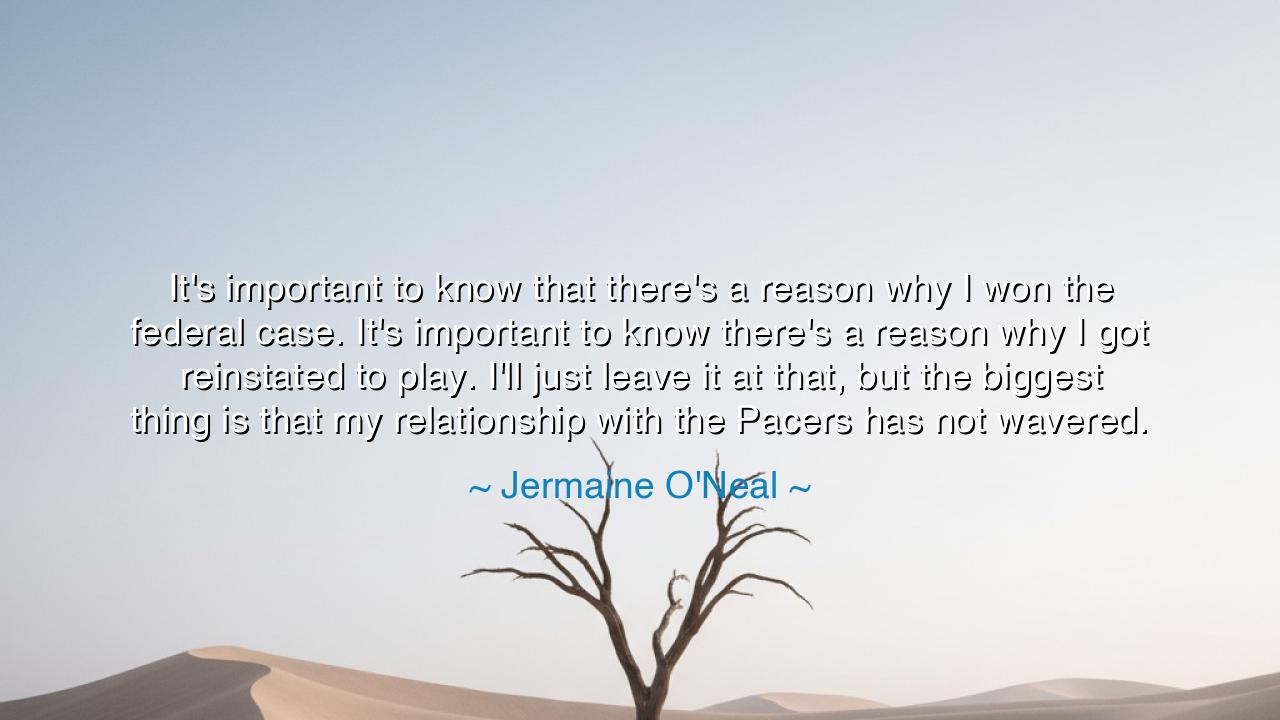
It's important to know that there's a reason why I won the
It's important to know that there's a reason why I won the federal case. It's important to know there's a reason why I got reinstated to play. I'll just leave it at that, but the biggest thing is that my relationship with the Pacers has not wavered.






The saying of Jermaine O’Neal, “It’s important to know that there’s a reason why I won the federal case. It’s important to know there’s a reason why I got reinstated to play. I’ll just leave it at that, but the biggest thing is that my relationship with the Pacers has not wavered,” rings with the solemn weight of trial, justice, and loyalty. Here is a man who endured judgment not only in the courts of law but also in the harsher courts of public opinion. He speaks as one vindicated, yet tempered, knowing that every victory comes wrapped in the fire of struggle.
The federal case was no mere skirmish of words; it was the reckoning of fate, where truth and justice contended against suspicion and condemnation. To win such a battle is not only to be cleared in law, but also to be affirmed in dignity. O’Neal, wronged by circumstance, reminds us that there is always a reason hidden beneath the surface — that divine thread which ties suffering to vindication.
His reinstatement was more than a return to the game of basketball; it was the restoration of honor. When he says he was allowed to play again, it is not merely the return of a player to the court, but the reawakening of a warrior to his calling. For the ancients knew well: when one is barred from his craft, his soul languishes; when restored, the soul breathes anew.
Yet above all, he declares the constancy of his relationship with the Pacers. Here is the truest sign of nobility: that despite trials, despite storms of anger and slander, his loyalty to his companions and his house of battle remained unbroken. This is the teaching for generations — that vindication is hollow if not joined with steadfast love, and that the greatest triumph is not the winning of cases, nor even the regaining of place, but the endurance of faith in one’s people.






DTHien Duong Thi
Jermaine O'Neal’s assertion that his relationship with the Pacers has never wavered speaks to his commitment and emotional connection to the team. But is it possible that such strong loyalty can sometimes prevent athletes from exploring opportunities elsewhere, even when it may benefit their career? Can an unwavering connection to one team ever be a hindrance in a player’s long-term growth, or is it something to be admired in professional sports?
TBThi Bmt
It’s fascinating how Jermaine O'Neal focuses on his legal victory and reinstatement as a crucial turning point, yet he doesn't delve into the specifics of the case. His decision to not revisit the details speaks volumes about how athletes sometimes choose to move past controversies, even if they’ve been a major part of their careers. Is this a sign of maturity or avoidance? Does leaving things unsaid help him maintain focus and professionalism?
PPhganh
Jermaine O'Neal’s words about his relationship with the Pacers being unwavering, despite the challenges he faced, are telling. It suggests a deep sense of loyalty and professionalism on his part. But how much of this loyalty comes from a sense of obligation versus genuine connection to the team? How much should a player's relationship with a franchise weigh in when making tough personal decisions, such as legal battles and career setbacks?
HTNguyen Hoai Trong
Jermaine O'Neal's statement seems to emphasize the importance of his legal victory and his resilience, but there's a sense of restraint in how he speaks about it. He clearly understands the significance of his reinstatement, but by leaving it at that, it’s almost as if he’s choosing not to revisit a painful or controversial chapter of his career. Does this silence speak to the personal growth or emotional weight he carries from the ordeal?